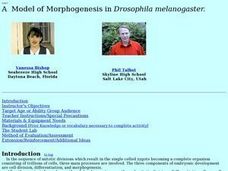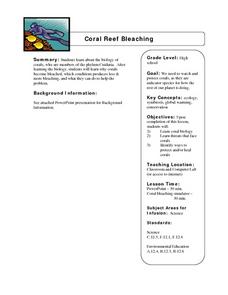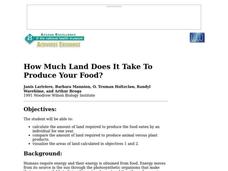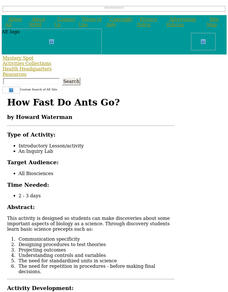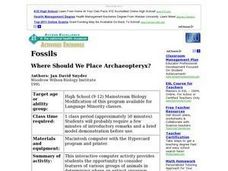Biology Teacher Resources
Bring learning to life with this diverse array of teacher resources. Grow your learners' intrigue as they dissect all that lives within and around them.
Showing 1,718 resources
Curated OER
Hazard Mitigation: Bioterrorism
Students discuss different ways to spread infectious diseases. In this bioterrorism lesson, students model the rate of smoke emission using CalRoad software. They analyze the effects of airborne release of biological...
Curated OER
Extraction of DNA from White Onion
Learners conduct lab test with minced onion to determine where chromosonal DNA is located within the cell, and whether or not it can be extracted.
Curated OER
A Model of Morphogenesis in Drosophila Melanogaster
Students investigate the following scientific terms and ideas: rates of diffusion, the role of morphogens in the development of larva, the chemical dynamics of a cell, and the significance of embryo polarity during development.
Curated OER
Muscles and Motor Locomotion
This is a fabulous presentation which should reinforce all aspects of muscle construction on a gross anatomical and micro level. There are slides to help understanding with the muscle fiber anatomy, and many labelled diagrams to...
Curated OER
Sex-Linked Traits
Again, the basis for trait inheritance and the impact of alleles in phenotypes was covered in previous videos. This presentation focuses on gender and the likelihood of traits if they are sex-linked. Sal tells a great anecdote about...
Virginia Department of Education
The Cell Cycle and Mitosis
What a packed lesson! Provide your class with the opportunity to learn about the cell cycle in several exciting ways. Biologists first learn about the theory behind mitosis, then proceed to view onion tips under the microscope and create...
Curated OER
Investigating Factors That Affect Cell Membrane Permeability
Cell membranes and the factors that affect its integrity are studied, with Beet tissue used as the model. A poster to display findings of the permeability of the membranes would clarify understanding and also allow a layer of language...
Curated OER
Gas Exchange And Respiratory Systems.
Explore structures within the realm of gas exchange in terrestrial and aquatic life. The excellent, labelled diagrams and clear descriptions help your students view the different structures and adaptations that have...
Curated OER
Introduction to Animals Concept Map
In this animal science worksheet, students complete a concept map on the features of animals. They fill in 12 blanks with the correct words from the list.
Curated OER
Swimming with Crabs
Students explore Earth science by completing several graphic organizer activities in class. For this oceanography lesson, students research ocean inhabitants such as blue crab and oysters. Students complete graphic organizers about the...
Curated OER
The Best Place in the United States to Live
Students, working in small groups, analyze information provided in U.S. maps to make a logical determination of the best place to live in the United States in regards to natural and human-made hazards. Then, working individually, they...
Curated OER
It's All In The Rocks
Students think critically to determine fact or inference when examining sedimentary layers with embedded fossils. Geology and evolutionary biology are introduced. They individually write a story about various diagrams and share their...
Curated OER
Earthworm Movement and Landscape Structure
Students describe differences in animal usage of habitats depending upon successional status of site. They also design other experiments to test movement patterns of animals through habitats of differing structure.
Curated OER
Estimating the Live Mass of Dinosaurs
High schoolers estimate the live mass of dinosaurs. Using dinosaur and modern animal models, students use simple displacement methods to calculate the volume of the models. They calculate the masses of each model. High schoolers...
Curated OER
Look but Don't Touch:
Students complete a graphic organizer after identifying three interesting facts from a web site. They role play that the NASA space probe has landed on Mars where a large animal was found and they develop the important questions they...
Curated OER
Coral Reef Bleaching
Young scholars explore the structural biology of corals. Working individually, students identify how corals become bleached and which conditions produce more and less coral bleaching. Young scholars explore how this effects the...
Curated OER
Student Guide: Evolution Videodisk from Videodiscovery
Young scholars use this worksheet with the videodisk from Video discovery titled Evolution: Inquiries into Biology and Earth Science.Written because there is no computerized control program available, it is to be used with a standard...
Curated OER
The Evolution of Canis pedatus
Students examine the given characteristics of a previously unknown dog-like creature, Canis pedatus, to decide if the creatures would survive when relocated to a new environment. They work in small groups to decide whether or not the...
Curated OER
How Much Land Does It Take To Produce Your Food?
Learners calculate the amount of land required to produce the food eaten by an individual for one year and compare the amount of land required to produce animal versus plant products. They use calorie counting resources to compile the...
Curated OER
"Endangered Species"
Students explore the definition of what an endangered or threatened species is and the criteria for a species being endangered or threatened. Many examples are shown and discussed with the students within this lesson. In addition, they...
Curated OER
How Fast Do Ants Go?
Students make discoveries about some important aspects of biology as a science. They study basic science precepts such as communication specificity, designing procedures to test theories by designing an experiment that tests the speed of...
Curated OER
Where Should We Place Archaeopteryx?
High schoolers classify Archaeopteryx using pictures of actual fossils and scientist representations of how the animal might have looked. They compare Archaeopteryx's characteristics to those of the five extant vertebrate groups to...
Curated OER
Taxonomy and the World of Microorganisms and Viruses
In this taxonomy instructional activity, students understand how organisms are classified using Linnaeus' system. Students classify organisms as either plant or animal. This instructional activity has 24 fill in the blank and 6 matching...
Curated OER
Seeing Cells
Sixth graders study living cells and their functioning units. In this cell lesson students color cell diagrams, answer questions and discuss the differences between plant and animal cells.




